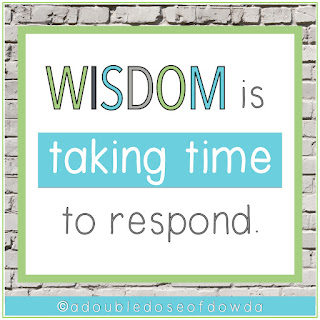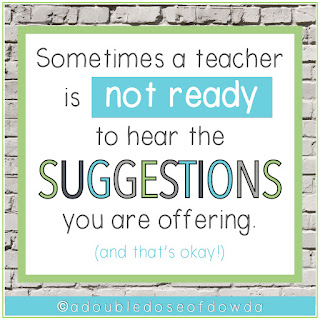Responding to teachers effectively is an important part of instructional coaching.
As an instructional coach, your response to a teacher’s problems can make a huge difference. Sometimes, it is necessary to take some time before responding to their concern or complaint. In addition, I share a strategy that I use when teachers are not yet ready to take my suggestions.What to look for in this post:
- You don’t have to have all the answers as an instructional coach
- Take time before responding to teachers
- Be aware of teachers’ resistance
If you prefer to hear me talk through this, here are two videos featuring all of this content:
You Don’t Have to Have All the Answers as an Instructional Coach
Sometimes as instructional coaches, we feel pressure to have answers right away. We are supposed to be experts and have all the answers, but there is a lot of power in telling a teacher that you are going to take some time. You can let them know that they have given you a lot to think about and you need to do some research before getting back to them. Provide them with a time frame for when you will be in touch, and take the time you need.Take Time Before Responding to Teachers
Often, teachers ask you questions after mustering a lot of courage in order to come to you with a problem. They may want to discuss something with which they have been struggling for a long time. If you have some brilliant idea for them within moments, that can actually feel a bit disheartening for them. It could be discouraging, and leave them feeling like they didn’t do or know something that was obvious to you. Taking your time allows you to give their concerns or complaints adequate thought and attention, but it also honors them and their experiences.Be Aware of Teachers’ Resistance
It is also important to be aware of teachers’ “buts”. This idea applies to the conversations we have with teachers where they say they are looking for suggestions, but respond with, “Yeah, but,” whenever we provide them. When they push back on something, it shows they are processing. There is then an opportunity to talk through it with them. After the conversation, there are times where you might hear another “Yeah, but”.If I get two “Yeah, but”s, I take a step back myself and stop offering suggestions. I focus more on listening to the teacher’s concerns or complaints, to make sure I really understand why they are hesitant. I ask more questions. Sometimes, even when the teacher is originally asking for suggestions, they may not yet be ready for the suggestions being offered. Back off, give it some more thought, and maybe try some different responses at a later time. Always be aware of the “buts”.
Check out these related posts:
Tips for Talking to Teachers as an Instructional Coach
Handling Teachers' Emotions as an Instructional Coach
Building Trust with Teams as an Instructional Coach
How to Build Relationships with Teachers as an Instructional Coach
Tips for Difficult or Uncomfortable Instructional Coaching Conversations with Teachers
Check out these related YouTube videos:
Friendly Reminder: Don’t “Should” On Your Teachers
It's Not Personal - Misguided Emotions from Burnt Out Teachers
Building Trust with Instructional Coaches
Use Your Planner to Strengthen Relationships with Teachers
Tips for Uncomfortable Instructional Coaching Conversations




No comments
Post a Comment